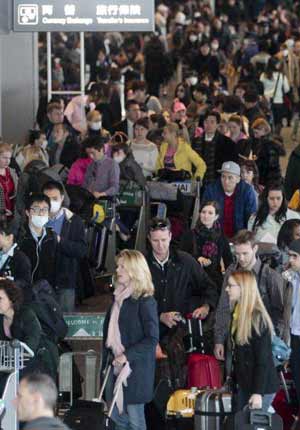Concerns deepen for UK citizens caught in Japan's disaster zone

The Foreign Secretary, William Hague, said yesterday there were "severe concerns" about British citizens who have not been located in Japan since last week's earthquake and tsunami, as the evacuation of all foreign nationalities increased.
Mr Hague said 50 more consular staff had been sent to the affected regions of Japan to visit hospitals and shelters in the hope of tracking down more of the 17,000 UK nationals who are thought to have been in the country when the disaster struck. So far there have been no reports of British fatalities. "Our consular teams in London and Japan have been working round the clock," he said. "We're following up all the leads from the helpline we have set up."
The Government advised British citizens to consider leaving Tokyo and the area north of the capital on Wednesday, because of continuing worries about radioactivity. The Foreign Office has chartered aircraft to fly anyone directly affected by the events from Tokyo to Hong Kong free of charge. Others have been recommended to use commercial flights, and many airlines are using larger aircraft to cater for the thousands waiting to leave.
Many other countries are conducting similar efforts, despite Red Cross reassurance that Tokyo was still safe. The US made its first evacuation flight yesterday evening, while thousands of French and Chinese citizens have already flown out. Australia has also advised its people to return home.
The Foreign Secretary's sombre words in Parliament came soon after it was confirmed that a British search and rescue team, which arrived in northern Japan on Sunday, would be flying home having not found a single survivor. The group of 70 specialists searched residential and industrial properties in the city of Kamaishi, but heavy snow and falling temperatures had decreased their chances of success still further in recent days. Earlier in the week they found several bodies in the town of Ofunato.
Andrew Mitchell, Secretary of State for International Development, said: "We are all extremely proud of the work of the UK Fire and Rescue team. Sadly, the chance of them finding further survivors is now extremely low and so their specialist skills are no longer necessary in Japan."
Around 380,000 people remain in temporary shelters following the destruction wreaked last Friday. By yesterday evening the official death toll had swollen to 5,400; but, with 9,500 still unaccounted for, the count is expected to keep growing for some time.
Economic analysis of the losses caused by the disaster remains in terms of broad estimates, but it is thought that the loss of output caused by damage to the country's infrastructure and services is around 50 per cent higher than that inflicted by the Kobe earthquake of 1995.
It is yet to become clear what kind of financial assistance or backing the world's third largest economy might need, and a conference call of G20 deputies yesterday evening was largely reduced to a brief discussion of the possible global risks posed by the continuing crisis followed by a further expression of solidarity with Japan.
A full G20 meeting is due to take place in Washington next month, and it is likely that only then will world leaders be fully able to understand what kind of additional problems they will have to tackle in already challenging financial conditions.
Join our commenting forum
Join thought-provoking conversations, follow other Independent readers and see their replies
Comments
Bookmark popover
Removed from bookmarks